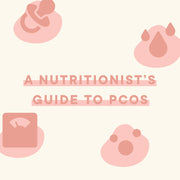
A Nutritionist’s Guide to PCOS
First of all: what is PCOS?
Polycystic ovarian syndrome (PCOS) affects around 20% of Australian women. PCOS can present differently in different women, making it a complex disorder that requires individualised treatment. However, the good news is PCOS is able to be managed naturally.
Despite the name, PCOS is not actually the presence of cysts on the ovaries, but a metabolic disorder in which the main causes of PCOS are high androgens (male hormones like testosterone) and high blood sugar or insulin resistance. Although confusing and often misdiagnosed, if you have polycystic ovaries, it does not mean you have polycystic ovarian syndrome.
Symptoms of PCOS
- Irregular or absent periods
- Oily skin and acne (especially on the jaw line)
- Weight gain
- Hirsutism (excess hair growth in a male like pattern)
- Difficulty conceiving
- High cholesterol and/or triglycerides

Different types of PCOS
Insulin Resistance
Insulin resistance is responsible for around 70% of PCOS cases. Insulin resistance means there is higher than normal levels of insulin in the body. High insulin causes the ovaries to stimulate excess androgens and can impair ovulation causing irregular or missing periods, and is responsible for many of the above symptoms.
Pill induced PCOS
Hormonal birth control suppresses ovulation, which can last months to years after stopping the pill. In this type of PCOS, symptoms such as an irregular cycle, acne and excess hair growth were not present before starting the pill.
Inflammatory PCOS
Chronic inflammation, such as due to unaddressed underlying disease or food intolerances can disrupt ovulation and disrupt hormonal balance. There may be normal blood sugar levels but elevated inflammatory markers on a blood test, such as CRP.
Adrenal PCOS
Adrenal PCOS is due to an abnormal stress response. A hormone called DHEA-S is usually elevated, however rarely tested which makes this type of PCOS difficult to diagnose. Adrenal PCOS usually accounts for about 10% of PCOS cases.
How to manage PCOS
The following is a great starting point and provides some common tools that can be used to improve PCOS symptoms naturally.
Dietary Changes
One of the first and most important steps to managing PCOS is modifying your diet.
- Reduce intake of refined carbohydrates (white bread, pasta, pastries, doughs, breakfast cereals, biscuits, cakes, lollies, chocolates etc.) which act like sugar and spike insulin levels which drives excess hormones and worsens PCOS symptoms.
- Make protein your best friend. Include one serving of protein in every meal and choose protein based snacks over carbohydrates. Protein helps to stabilise blood sugar.
- Increase consumption of omega 3 fatty acids, which are important for PCOS as they help lower inflammation, androgens and help to improve insulin resistance, acne and hair loss.
- Reduce caffeine consumption, as caffeine can increase cortisol levels which leads to increased insulin and androgens.

Lifestyle Changes
- Exercise helps improve insulin levels and regulates hormones. As a rule of thumb, aim for 30 minutes per day.
- Manage stress levels. Stress increases cortisol levels, which worsens PCOS. Find a stress management technique that works for you and practice it every day. Our favourite way to unwind is with a cup of Moon Mylk - our clean hot chocolate blend containing key ingredients such as ashwagandha & magnesium plus vitamins, minerals & antioxidants to enrich your wellbeing.

*As PCOS is such a complex condition involving multiple systems, it is best you speak with your health practitioner to get the best treatment plan that is specific to your individual case.

By Breeanna Betar
Breeanna is a degree qualified Clinical Nutritionist specialising in women’s health. In her private clinic, she works one on one with women to help them achieve their health goals. Bree possesses a profound understanding of women’s health needs and is committed to sharing her knowledge with the Naked Harvest community, and is proud to be involved in Naked Harvest’s mission of revolutionising the active supplement industry.
![[Nav_Category_shop-all.jpg] SHOP ALL](http://www.nakedharvestsupplements.com/cdn/shop/files/Nav_Category_shop-all_medium.jpg?v=229551162107522660)
![[Nav_Category_xmas.jpg] LIMITED EDITION](http://www.nakedharvestsupplements.com/cdn/shop/files/Nav_Category_xmas_medium.jpg?v=1012164896126411562)
![[Nav_Category_protein.jpg] PLANT PROTEIN](http://www.nakedharvestsupplements.com/cdn/shop/files/Nav_Category_protein_medium.jpg?v=3001415470058422894)
![[Nav_Category_pre.jpg] NATURAL PRE-WORKOUT](http://www.nakedharvestsupplements.com/cdn/shop/files/Nav_Category_pre_medium.jpg?v=6814586239177681891)
![[Nav_Category_moonmylk.jpg] BEDTIME HOT CHOCOLATE](http://www.nakedharvestsupplements.com/cdn/shop/files/Nav_Category_moonmylk_medium.jpg?v=12631405938823957710)
![[Nav_Category_wellness.jpg] GORGEOUS GREENS](http://www.nakedharvestsupplements.com/cdn/shop/files/Nav_Category_wellness_medium.jpg?v=12528176088121862281)
![[Collagen_category.jpg] COLLAGEN](http://www.nakedharvestsupplements.com/cdn/shop/files/Collagen_category_medium.jpg?v=7874986955741861029)
![[Nav_Category_Creatine.jpg] CREATINE](http://www.nakedharvestsupplements.com/cdn/shop/files/Nav_Category_Creatine_medium.jpg?v=5379326253006347654)
![[Nav_Category_snacks.jpg] NAKED SNACKS](http://www.nakedharvestsupplements.com/cdn/shop/files/Nav_Category_snacks_medium.jpg?v=5445899139946707385)
![[Nav_Category_onthego.jpg] ON-THE-GO](http://www.nakedharvestsupplements.com/cdn/shop/files/Nav_Category_onthego_medium.jpg?v=9258968730903582129)
![[Nav_Category_bcaa.jpg] BCAA'S](http://www.nakedharvestsupplements.com/cdn/shop/files/Nav_Category_bcaa_medium.jpg?v=737338853559660987)
![[Nav_Category_accessories.jpg] ACCESSORIES](http://www.nakedharvestsupplements.com/cdn/shop/files/Nav_Category_accessories_medium.jpg?v=8748347510610747858)
![[Nav_Category_samples.jpg] SAMPLES](http://www.nakedharvestsupplements.com/cdn/shop/files/Nav_Category_samples_medium.jpg?v=12269696752583776743)
![[Nav_Category_giftcard.jpg] GIFT CARDS](http://www.nakedharvestsupplements.com/cdn/shop/files/Nav_Category_giftcard_medium.jpg?v=1625935370118938582)
![[Nav_Category_pilates.jpg] Yoga/Pilates](http://www.nakedharvestsupplements.com/cdn/shop/files/Nav_Category_pilates_medium.jpg?v=13143021470193189408)
![[Nav_Category_high-intensity.jpg] High Intensity](http://www.nakedharvestsupplements.com/cdn/shop/files/Nav_Category_high-intensity_medium.jpg?v=1128519081117118136)
![[Nav_Category_low-intensity.jpg] Lifestyle](http://www.nakedharvestsupplements.com/cdn/shop/files/Nav_Category_low-intensity_medium.jpg?v=9882188842252146182)
![[Nav_Category_strength.jpg] Strength Training](http://www.nakedharvestsupplements.com/cdn/shop/files/Nav_Category_strength_medium.jpg?v=12070627897078322724)
![[Nav_Category_recovery.jpg] Recovery](http://www.nakedharvestsupplements.com/cdn/shop/files/Nav_Category_recovery_medium.jpg?v=17305895227804480374)






